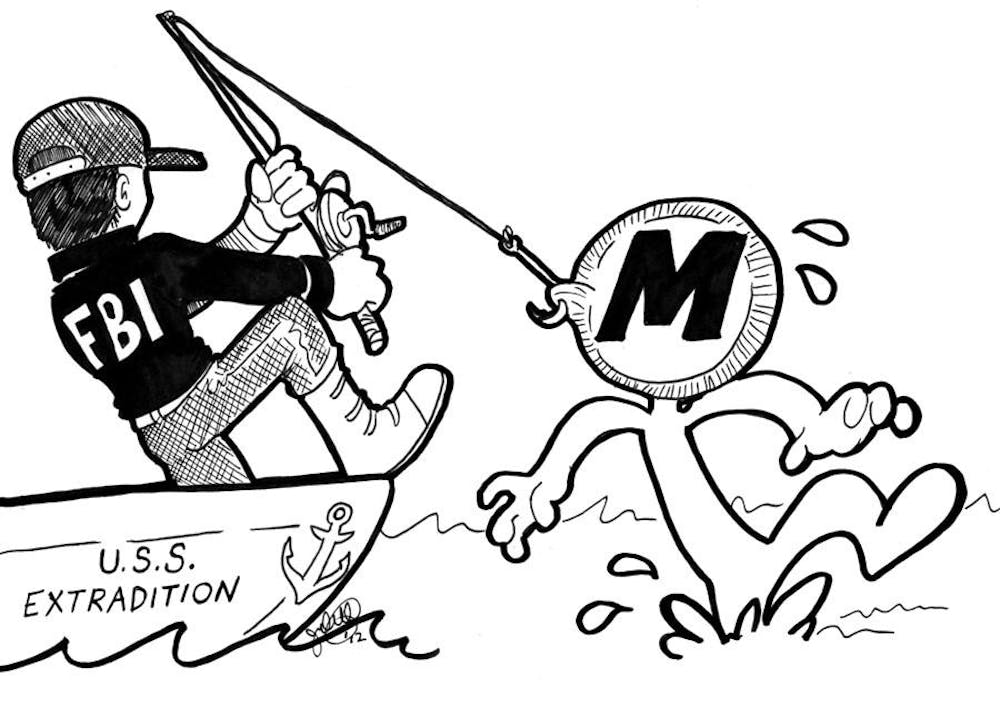It feels like just weeks ago when celebrities such as will.i.am and Alicia Keys were endorsing online file-sharing site MegaUpload through song in the eponymous viral video.
Oh, wait. It was a few weeks ago.
Fast forward, and after a tense legal battle about whether the video was infringing on Universal Music Group’s copyright (it wasn’t), MegaUpload is once again in hot water.
For those of you who haven’t heard, MegaUpload was recently shut down by the United States Department of Justice.
Although none of the site’s founders reside in the U.S. or are U.S. citizens, government agents extracted a terrified Kim “Dotcom” Schmitz from his sprawling New Zealand compound (where he was hiding in a safe room with a sawed-off shotgun).
There, they arrested him on charges of copyright infringement, racketeering and money laundering, among other things.
Dotcom is currently being held in New Zealand, as the United States is trying to come to an agreement to extradite him.
Seven others associated with the site were also arrested.
MegaUpload was officially based out of Hong Kong, although Chinese users are blocked from the site for undisclosed reasons.
The site encompassed not only MegaUpload, but also the beloved Megavideo, as well as MegaPix, MegaLive, MegaBox and MegaPorn.
In addition to the Hong Kong operation, the company leased servers in Virginia, giving the U.S. Department of Justice cause to intervene, with a not-insubstantial nudge from Entertainment Industry lobbyists, in what they are calling the “Mega-Conspiracy.”
MegaUpload is alleged to have enabled and rewarded copyright infringement among its millions of users.
According to the official indictment, the site has more 180,000,000 registered users, 50,000,000 daily visitors and approximately 4 percent of all internet traffic.
The indictment hinges its claims on the assumption that MegaUpload is “heavily dependent on the popularity of copyright infringing content to attract website visits.”
Here’s the problem.
It is certainly dependent on the popularity of copyright infringing content.
Dotcom and his associates, however, were doing only a very small part of the copyright infringement themselves; Dotcom uploaded a 50 Cent album.
They simply provided a forum for others to infringe, from which those associated with MegaUpload could then profit.
This is morally questionable, but should the law pursue them for it?
They didn’t force people to post infringing content; they simply gave them a way they could do so.
Their so-called rewards system rewarded people with the content that attracted the most downloads or views, which, in this case, was obviously infringing content.
Although the 72-page indictment is full of what seems to be valid reasoning, can they really be punished for having a savvy business model?
Of course, their money laundering and racketeering are other offenses punishable by law, which are separate issues and are not being contested here.
Especially in light of the recent Stop Online Piracy Act controversy, the shutdown of MegaUpload creates even more ethical and legal quandaries.
Where must we draw the line?
By shutting down MegaUpload, the U.S. Department of Justice has not only stopped piracy but also blocked many paying U.S. customers from access to the fully legal files they store and regularly use through MegaUpload.
The department is denying many U.S. citizens access to their property because of the infringing actions of others using the same platform.
Moreover, the U.S. Department of Justice has proved just how redundant SOPA really is and how little control we have.
SOPA doesn’t even really need to be passed; if this is any example, the U.S. can do pretty much everything in the bill already.
Hacker collective Anonymous launched what is supposedly the largest denial of service attack in history, targeting sites such as the Department of Justice and the Motion Picture Association of America in retaliation, but where has it gotten them? Those sites are back up, and MegaUpload is still down.
Although some filesharing sites, such as FileSonic, have temporarily blocked their sharing capacities, people are still downloading things illegally everywhere.
That’s the problem that all offended parties are failing to address: Filesharing culture has become so common that most people do it casually nowadays.
Everyone in the media and the government seems to miss this, dividing the issue into two polarized categories: the copyright zealots and the hacktivists.
The in-betweeners, which is the vast majority, have been forgotten.
Most of us aren’t conspiring to make insane amounts of money from others’ work or bring down websites of people that offend us.
We’re just downloading things because they’re convenient, free and available.
Meanwhile, the U.S. government is working on a program to create government-issued online identities for its citizens.
If that doesn’t make you feel like your web identity and freedom is being compromised, nothing will.
MegaUpload is just the first in a series of battles, the Fort Sumter that will lead to the civil war for cyberspace. It is just the sprout that’s showing from a literal web of roots that go miles deep.
So, whether you’re a downloader or a creator of content or just someone in between, it’s time to choose your side and prepare for war. It’s coming.
Megaupload, Megabusted

Get stories like this in your inbox
Subscribe




